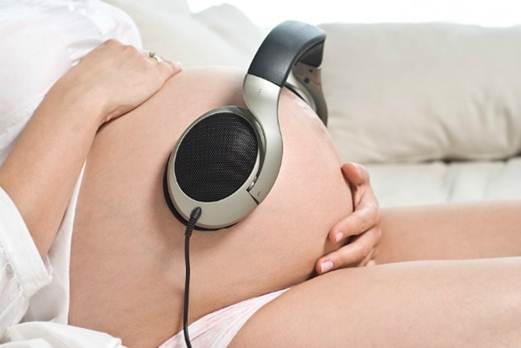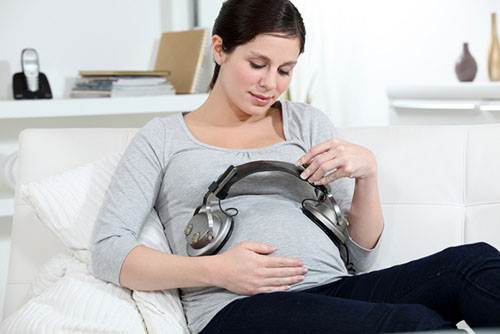Is it right that children can get smart by listening to music?
How to listen to music correctly during pregnancy?
Nobody could be sure whether music has effects on fetal
developments or not. There are some researches showing that fetuses can hear
and react to sounds by moving. No one could really know the meanings of those
actions as the specialists can’t observe fetuses easily as observing babies.
Does listening to music make children be smarter than they were when in the
womb?
There’s no research confirming the statement. You may have
heard that listening to music can make children at all ages get smart and be
good at math. However, a researcher that lead the major of neuroscience at the
California University said that those researches mostly concentrate on
children, not fetuses.

There’s no
official research confirming about listening to music could make fetuses
smarter.
For example, Piano lessons can improve children’s ability of
space syllogism (succeeding in understanding 3-dimensions space). The
experiment is only carried out on children who are from 3-4 years old. By the
result of the experiment, specialists infer as if music does have strong
effects on children and infants, fetuses can receive the benefits from music in
the same way of the later ones.
Some people think that infants can recognize the type of
music their parents let them listen to when they were in the womb, and children
will be more active or find it easier to get in to sleep when listening to a
familiar song. However, a psychologist studying fetal developments said that
those statements were rumors and weren’t based on any official research.
Besides, some researches show that fetuses move and breathe
by the rhythm of melodies; however, specialists are still not sure whether it’d
be good for fetuses. The reactions to melodies or to other sounds from the
outside world can’t show the feelings of fetuses towards them.
How to let children listen to music?
Though there’s no official conclusion of classical music that
can make fetuses smarter, researchers agree that listening is a good option for
pregnancy whether it has direct effects on fetal developments or not. If pregnant
women love classical music, the music can help south their soul. And when
pregnant women feel better, less stressed, it’d be good for fetuses.
It’d be better if pregnant women and fetuses listen to music
with speakers. If theyare afraid the sounds that the speaker provides are not
loud enough for fetuses to hear, they lay the headphone on their abdomen for a
better hearing. However, specialists recommend pregnant women not doing that
for over an hour as the amniotic fluid can amplify sounds. So, if you let
fetuses listen to music in too long a time, their hearing will be negatively
affected. To preserve safety, you should let fetuses listen music 2-3 times a
day in 20 minutes each.

Letting fetuses
listen to music for too long a time can make their hearing negatively affected.
Normally, in the fourth month of the pregnancy, fetuses can
react to sounds from the outside, but that they kick hard doesn’t mean they
like the music. Fetuses spend most of the time in the womb on sleeping; the
unexpected noise can interrupt their sleeps and cause circadian rhythm
disorders. Therefore, that parents try to increase the volume of the TV, as
they’re afraid their fetuses can’t hear the sound from the TV, is completely
unnecessary.
When does the noise get too loud?
Fetuses or newborns and even adults have a limit in receive
a certain level of sound. If the music gets too loud, the hearing of newborns
might be not good.
The American Academy of Pediatric has done a research on
pregnant women working on fields that include loud sounds. The research results
in the loud sounds can increase the chance of premature birth, low birth weight
as well as the higher chance of hearing loss in comparison to other children.

The research
results in the loud sounds can increase the chance of hearing loss in children.
Nowadays, song that are selling in stores are often at about
65 decibel (dB), the volume that can hurt or make fetuses startled when they
hear it in a long period of time. The tip is you should remain the music under
50dB for fetal safety. 50dB is also the volume that is used in most of fetal
health cares.
The followings are popular levels of volume in a house.
Pregnant women can base on those to adjust the level of volume of songs.
·
Washing machine: 50-70dB
·
Dishwasher: 55-70dB
·
Vacuum cleaner: 60-85dB
·
Hairdryer: 60-95dB
·
Alarm ring: 65-80dB
·
The sound of water flushing in a toilet: 75-85 dB
·
Phone ring: 80dB
Music like foods and drinks: lacking music will cause intellectual
inadequacy, too much music will cause excesses; there’re good and bad sounds,
songs that some people like while others not.

‘Moderation’
is the key word when pregnant women decide to let fetuses listen to music.
What is the good way to let fetuses listen to music? The
question is still remained. However, there’re tips based on logical theories
with no reasonable evidence. There has been no answer for the question: “does
listening to music help children get smart?”, though; listening to gentle music
helps pregnant women relaxed, reduce stress, tiredness and have better sleeps,
which is very good for them and has indirect effects on fetuses.
‘Moderation’ is the key word when pregnant women decide to
let fetuses listen to music. Instead of forcing fetuses listening to music as
much as possible, laying the headphone on the abdomen or make yourself listen
to music a lot (even the type of music can disturb you), let fetuses enter on
music in natural ways. For example, you can listen to your favorite song,
listen to music when you are happy and comfortable, or you can sing for you and
your fetuses. Never make yourself listen to a song. Remember that the fetus is
a part of your body, so they can feel all of your physical activities.